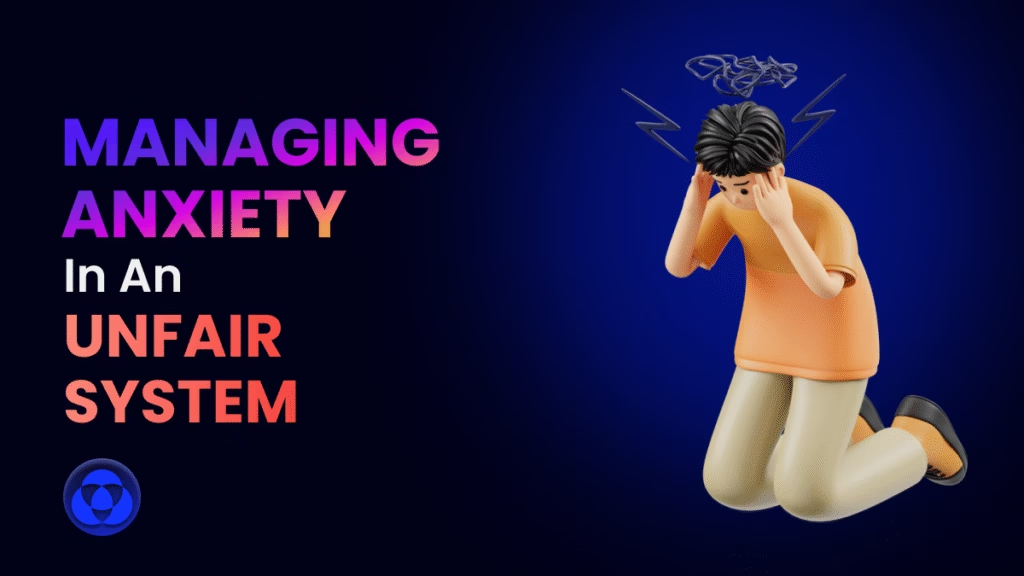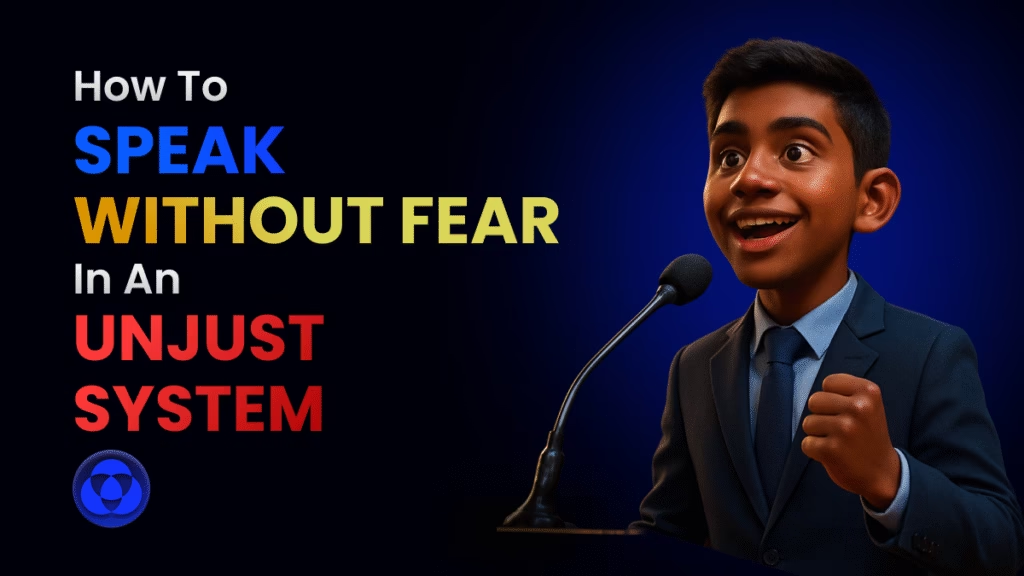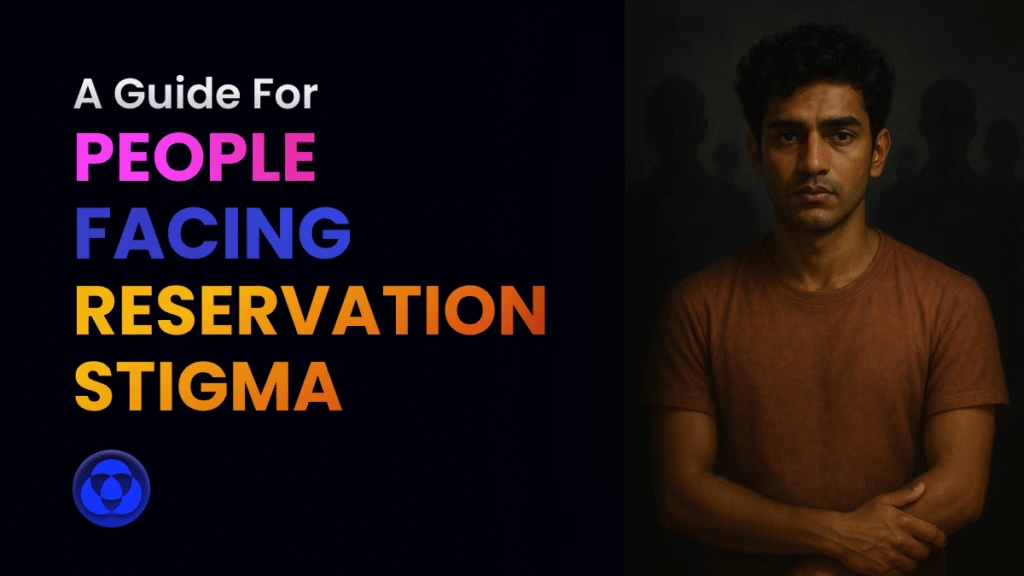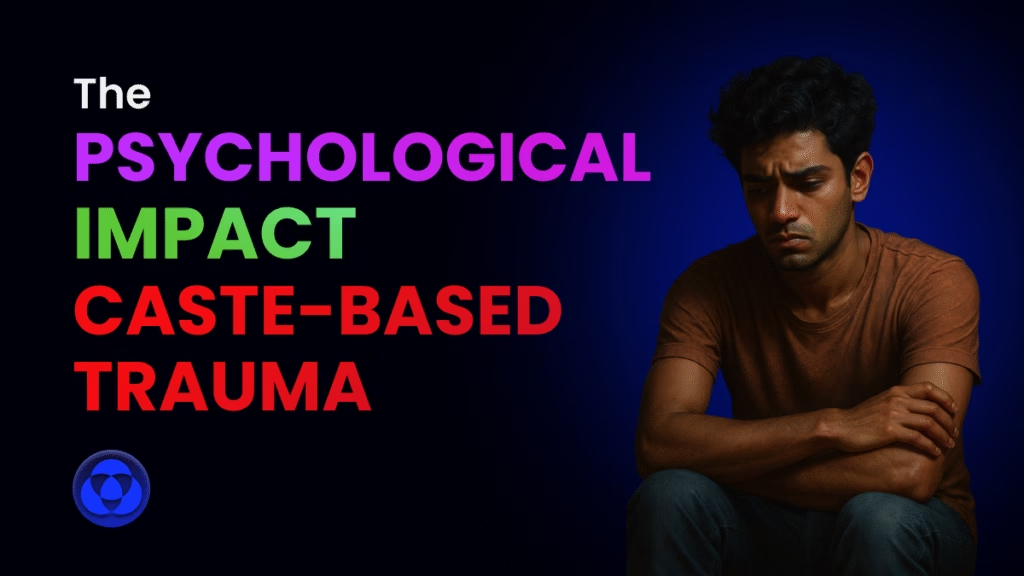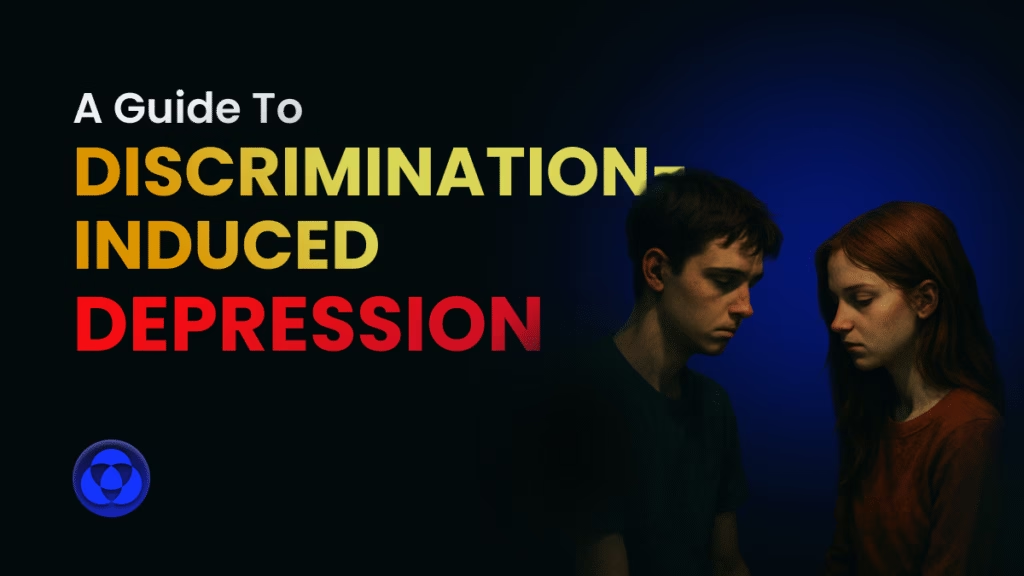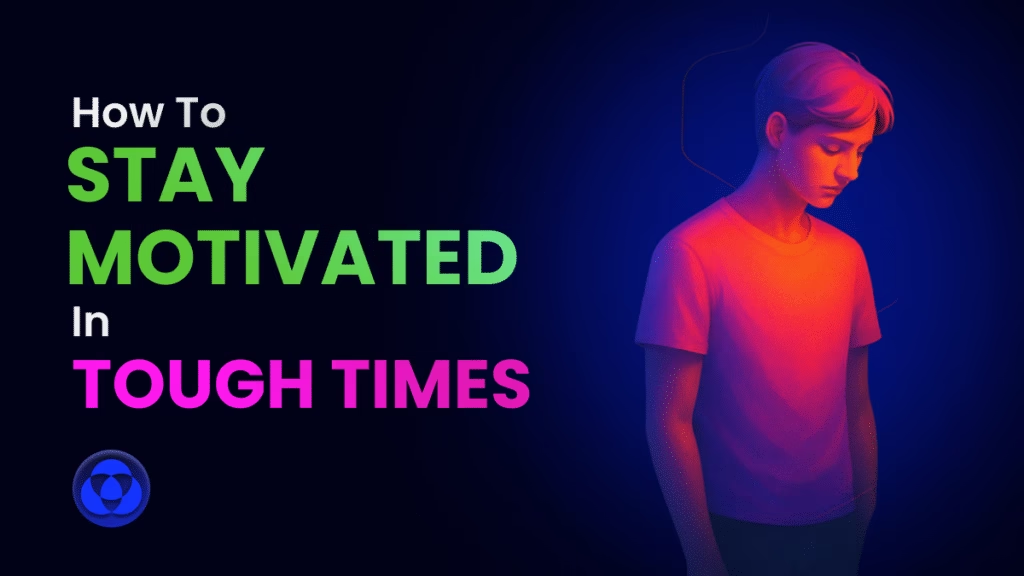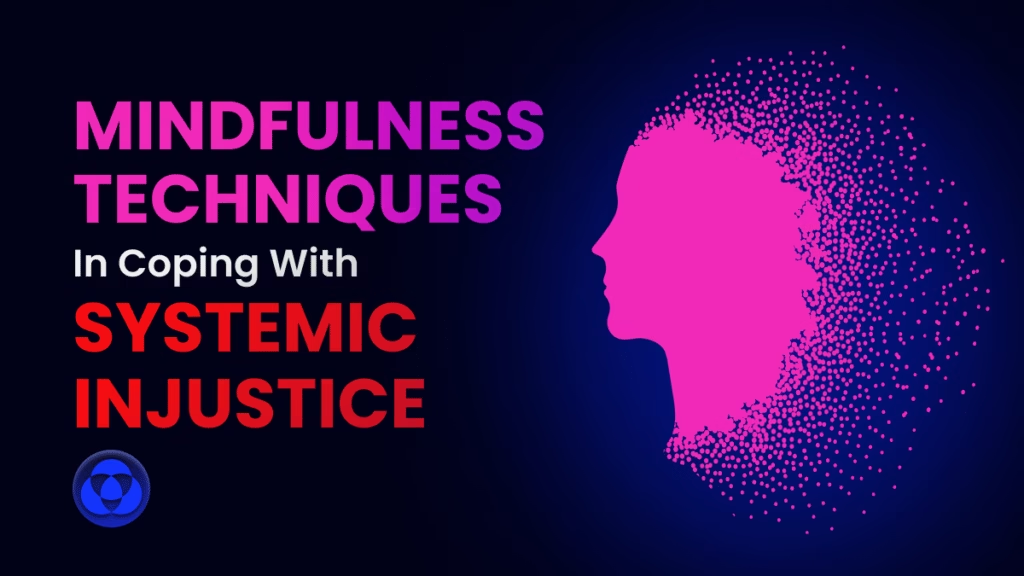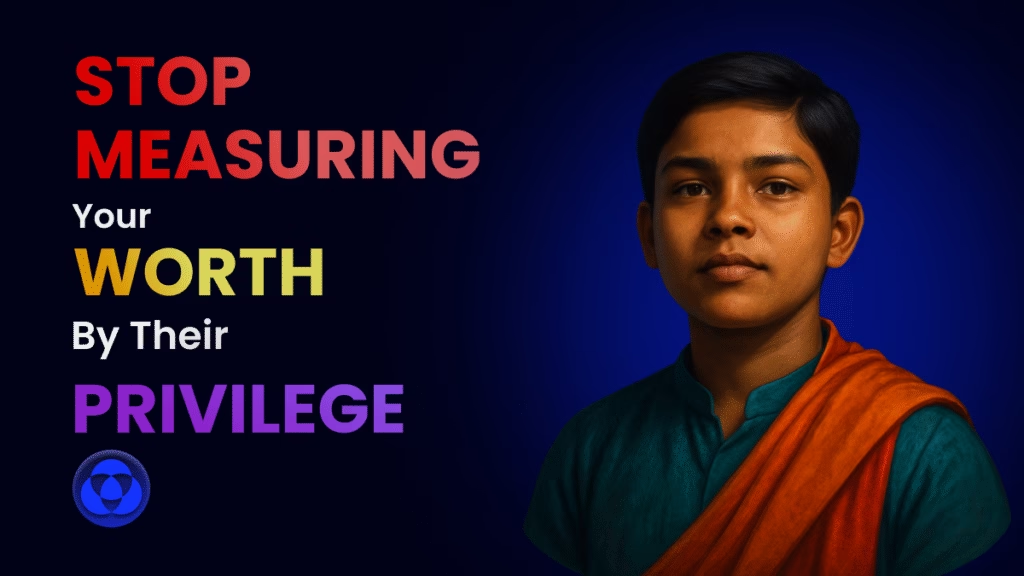Do you often feel overwhelmed, like no matter how hard you try, the system is working against you? That knot in your stomach when entering certain spaces, the racing thoughts before speaking up, or the constant worry about whether you’re being judged differently—these are common experiences for many Bahujans navigating a society structured around caste hierarchies.
Anxiety isn’t just a personal struggle; it’s often a natural response to real systemic challenges. For Bahujans, anxiety can stem from generations of oppression, ongoing discrimination, financial instability, and the daily stress of navigating spaces that weren’t designed with your success in mind.
This guide explores how systemic injustice contributes to anxiety among Bahujans, the physical and mental effects of this chronic stress, and most importantly, practical strategies for managing anxiety while building resilience in an unfair system. Whether you’re dealing with workplace discrimination, social exclusion, or the weight of generational trauma, you’ll find tools here to help reclaim your mental well-being and confidence.
Understanding Anxiety in the Context of Systemic Injustice
Anxiety is our body’s natural response to perceived threats. We’re biologically wired to react to unfairness—studies show that when we witness or experience injustice, it triggers our amygdala, the primitive part of the brain controlling fear and anger, putting us into fight-or-flight mode. For Bahujans, these threats aren’t occasional stressors but constant realities embedded in social structures.
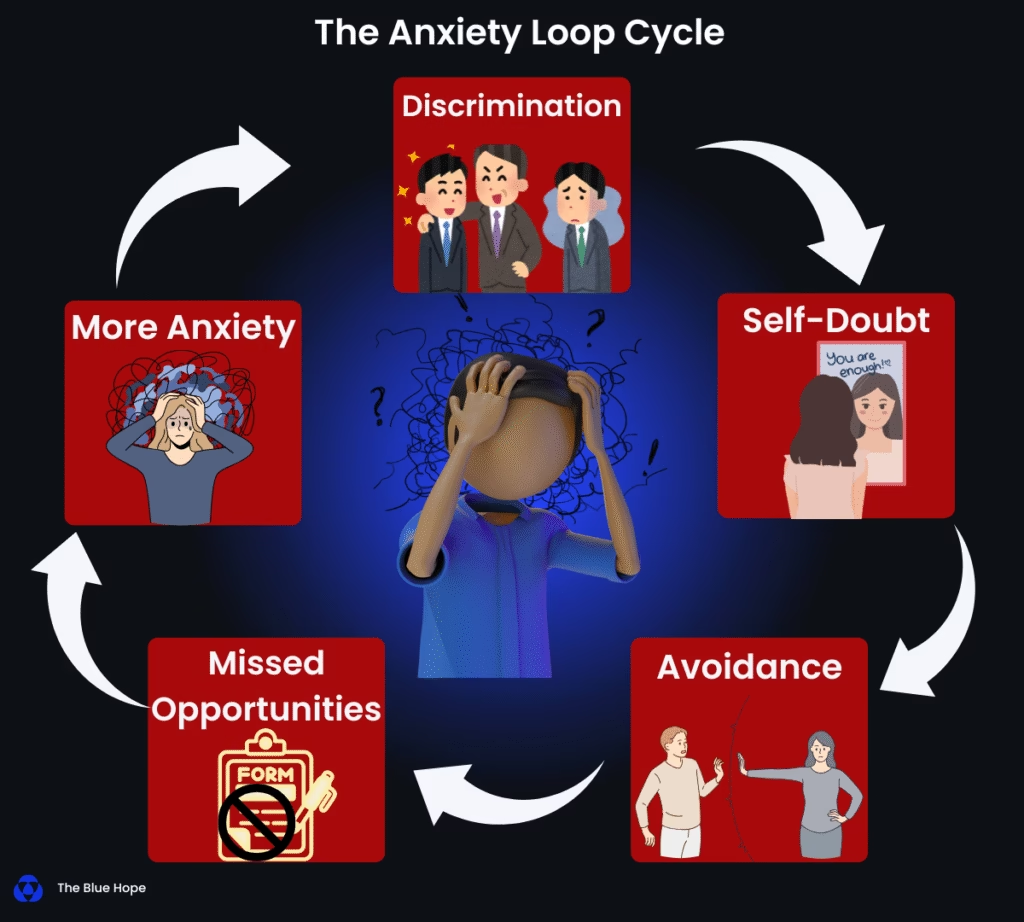
Historical Context and Present-Day Realities
Caste-based discrimination has historically restricted Bahujans’ access to education, employment, and social mobility. Though laws have changed, the social and economic consequences continue to shape daily experiences. This isn’t just about the past—it manifests today as:
- Workplace discrimination and barriers to advancement
- Housing segregation and limited access to resources
- Educational environments where achievements are questioned or minimized
- Social settings where subtle exclusion or microaggressions are common
These experiences create a state of chronic stress. Unlike acute stress that comes and goes, this persistent anxiety becomes a constant companion, affecting how you view yourself and your place in the world.
The Daily Experience of Discrimination
For many Bahujans, discrimination isn’t a rare occurrence but a daily reality that creates ongoing anxiety. This persistent exposure to social exclusion, stigmatization, and marginalization leads to stress, anxiety, depression, and trauma. The chronic nature of these experiences means the body remains in a heightened state of alert, never fully relaxing.
Poverty, social marginalization, and limited access to quality healthcare and nutrition—issues disproportionately affecting marginalized communities—further compound anxiety. These aren’t just social problems; they become embodied as mental health challenges.
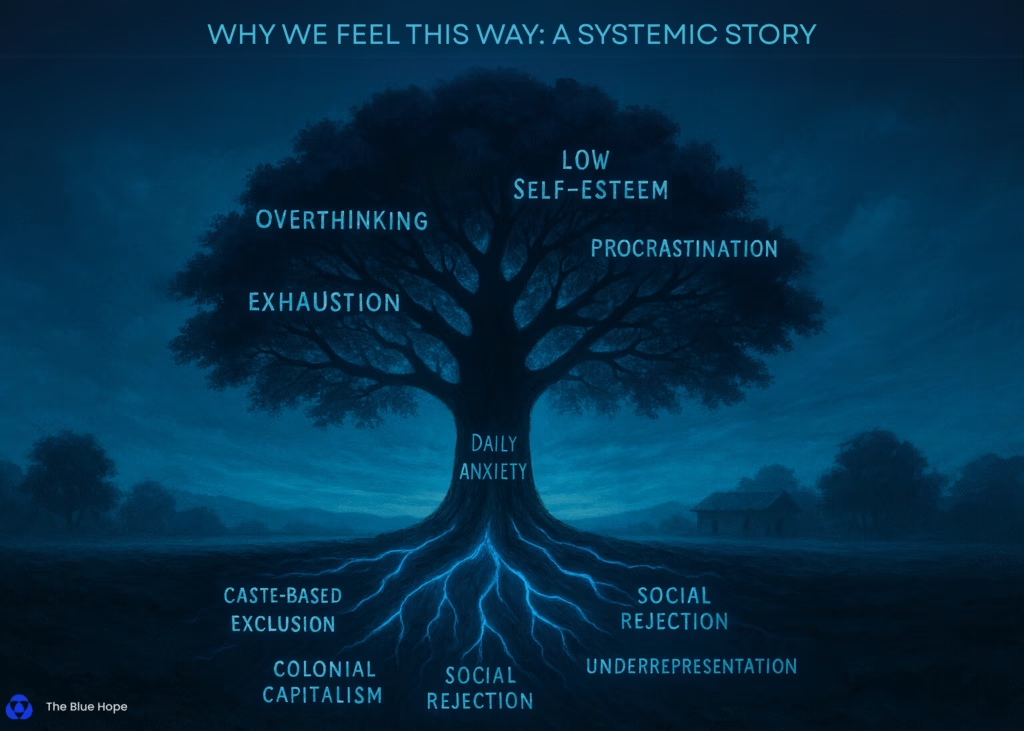
The Physical and Mental Impact of Chronic Anxiety
Living with constant anxiety doesn’t just affect your mind—it takes a significant toll on your body as well.
Physical Effects of Long-Term Anxiety
Chronic anxiety can lead to serious physical health issues, including:
- Cardiovascular problems like high blood pressure and increased risk of heart disease
- Weakened immune system, making you more vulnerable to illnesses
- Gastrointestinal disorders, including indigestion and irritable bowel syndrome
- Muscle tension leading to pain, headaches, and chronic discomfort
- Breathing difficulties and respiratory issues
- Sleep disturbances that further compromise health
Mental and Emotional Consequences
The psychological impact of chronic anxiety can be equally devastating:
- Cognitive decline affecting memory, focus, and decision-making
- Increased risk of developing other mental health conditions like depression
- Hormonal imbalances affecting overall well-being
- Difficulties with concentration and productivity
- Reduced self-confidence and heightened self-doubt
For Bahujans, these effects are compounded by the reality that seeking help often means navigating healthcare systems that may lack cultural sensitivity or understanding of caste-based trauma.
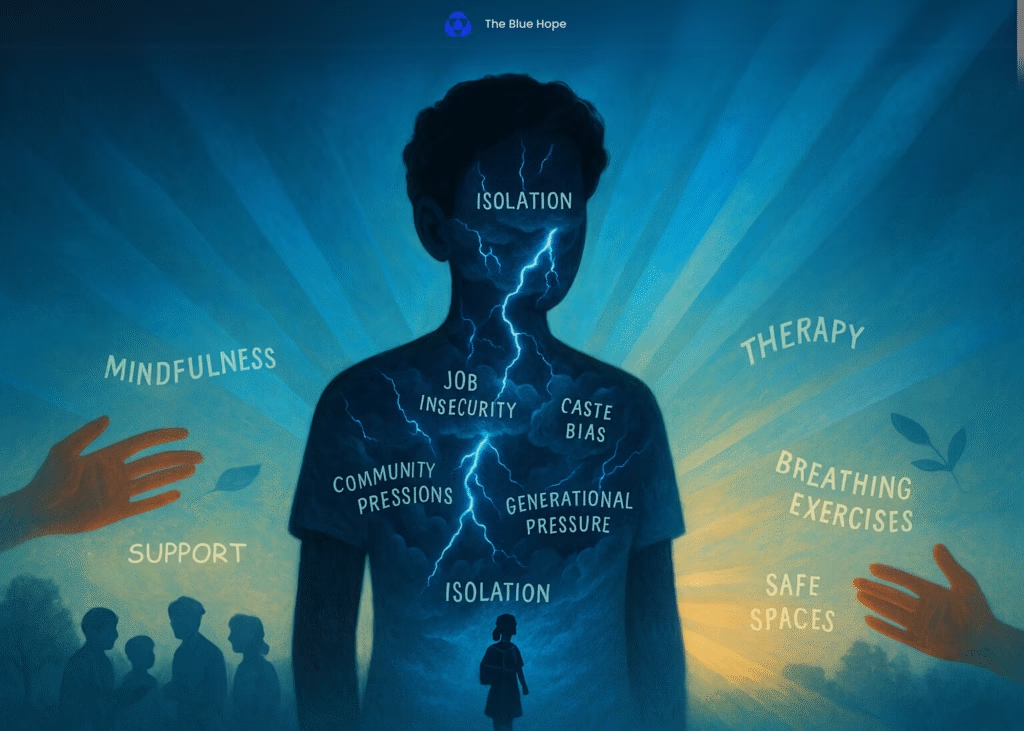
Strategies for Managing Anxiety in an Unfair System
While we can’t immediately change systemic injustice, we can develop tools to protect our mental health and well-being. Here are practical approaches to managing anxiety while navigating an unfair system:
1. Focus on What You Can Control
A significant portion of anxiety comes from focusing on circumstances beyond our control. When facing systemic injustice, it’s easy to become overwhelmed by the magnitude of the problem.
Instead of getting caught in thoughts about corporate greed or systemic unfairness, channel your energy toward solutions within your reach. For example, if your health insurance becomes unaffordable, rather than dwelling on the injustice, focus on researching alternatives or connecting with community resources.
This doesn’t mean ignoring systemic problems—it means strategically directing your energy where it can make a difference in your immediate life while preserving your mental resources.
2. Challenge Distorted Thinking Patterns
Anxiety often thrives on distorted thoughts—mental patterns that develop as protective mechanisms but ultimately increase fear and worry. Common distortions include:
- Catastrophizing: Assuming the worst possible outcome
- Overgeneralizing: Believing one negative experience means everything will go wrong
- Mind-reading: Assuming others are judging you negatively without evidence
To challenge these patterns, practice examining your thoughts objectively. When you catch yourself thinking, “I’ll never succeed because the system is against me,” pause and reframe it to something more balanced: “The system presents challenges, but many Bahujans have succeeded despite these barriers, and I have strengths that can help me navigate them.”
3. Practice Mindfulness and Grounding Techniques
Mindfulness helps bring your attention back to the present moment when anxiety pulls you into worries about the past or future. This practice is particularly valuable when discrimination and systemic challenges make it easy to become caught in cycles of rumination.
Simple mindfulness practices include:
- Focusing on your breath for 2-3 minutes
- Noticing five things you can see, four things you can touch, three things you can hear, two things you can smell, and one thing you can taste
- Practicing body scans to release tension you may not realize you’re holding
These techniques help interrupt the anxiety cycle and return to the present moment, where you can respond thoughtfully rather than react from fear.
4. Develop a Structured Approach to Problems
Anxiety can make problems seem overwhelming and unsolvable. Creating a structured approach helps break down challenges into manageable steps:
- Make a list of what’s causing your anxiety
- Identify what aspects you can influence or control
- Create a specific plan with actionable steps
- Set realistic timelines for addressing each issue
- Start with smaller, more manageable tasks to build confidence
This approach transforms vague worries into concrete problems with potential solutions, reducing the sense of helplessness that often accompanies systemic challenges.
5. Cultivate Self-Compassion and Positive Self-Talk
The experience of discrimination can internalize negative messages about your worth and capabilities. Countering these messages requires intentional practice of self-compassion and positive self-talk.
Replace self-critical thoughts with affirming statements that acknowledge both challenges and strengths: “This situation is difficult, and it’s unfair that I have to deal with additional barriers. I’m doing my best with the resources I have, and that’s enough.”
Remember that practicing self-compassion isn’t self-indulgence—it’s a necessary foundation for resilience in the face of systemic challenges.
6. Establish Healthy Boundaries
Setting boundaries is crucial for protecting your mental health, especially when navigating spaces where microaggressions or discrimination may occur. This might include:
- Limiting exposure to news or social media that triggers anxiety
- Being selective about which social environments you engage with
- Clearly communicating your needs in professional settings
- Giving yourself permission to leave situations that feel harmful
Boundaries aren’t selfish—they’re necessary self-preservation in a system that often doesn’t prioritize your well-being.
7. Build Supportive Communities
Connection with others who share similar experiences can be profoundly healing. Supportive communities provide:
- Validation that your experiences are real, not imagined
- Shared strategies for navigating challenging situations
- Emotional support during difficult times
- Opportunities to witness others’ resilience and success
These connections counteract the isolation that systemic exclusion often creates and provide practical wisdom for navigating similar challenges.
Reclaiming Confidence and Well-Being
Beyond managing anxiety, Bahujans can take proactive steps to build confidence and reclaim well-being even within an unfair system.
Acknowledge and Learn from Setbacks
Failure is a natural part of any journey, but in an unfair system, it’s easy to attribute setbacks solely to discrimination rather than seeing them as opportunities for growth. When facing disappointment—like not getting a job you interviewed for—use it as a chance to reflect on what you might improve while also acknowledging the potential role of systemic factors.
This balanced perspective allows you to extract valuable lessons without internalizing failure as a reflection of your worth or abilities.
Connect with Cultural Strength and History
Understanding the rich history of Bahujan resistance, achievement, and resilience provides a counter-narrative to dominant stories that emphasize victimhood. Learning about historical figures who overcame similar or greater barriers can inspire confidence in your own capacity to navigate challenges.
This connection to cultural strength isn’t just inspirational—it provides practical wisdom about strategies that have worked for others in similar circumstances.
Practice Regular Self-Care
Self-care isn’t a luxury—it’s essential maintenance for anyone navigating chronic stress. Effective self-care includes:
- Physical activity that releases tension and improves mood
- Adequate rest and nutrition
- Creative expression through art, writing, or music
- Spiritual practices that provide meaning and perspective
- Time in nature or other environments that feel restorative
These practices help counteract the physical and emotional toll of chronic stress, creating resilience for ongoing challenges.
Seek Professional Support When Possible
While access to culturally sensitive mental health care remains a challenge, professional support can be invaluable when available. Look for:
- Therapists with understanding of caste dynamics and systemic oppression
- Community mental health resources with sliding scale fees
- Online therapy options that may be more accessible or affordable
- Support groups specifically for Bahujans or other marginalized communities
If traditional therapy isn’t accessible, consider alternative resources like mental health apps, books on anxiety management, or community healing circles.
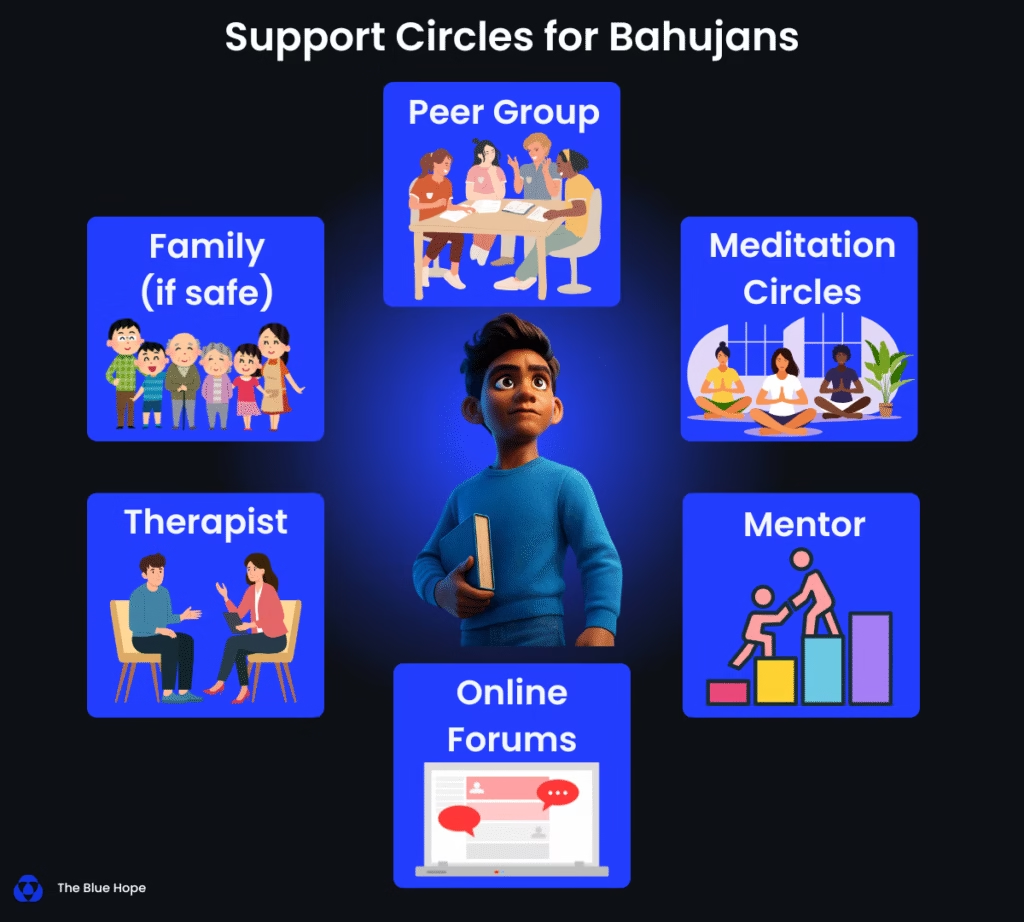
Addressing Common Concerns
Q1: How can I manage anxiety when discrimination feels constant?
Constant discrimination creates a unique challenge because the threat is real, not imagined. The key is distinguishing between preparation and rumination. Preparation involves developing strategies for specific situations, while rumination involves repetitive worry without productive outcomes.
Practice noticing when thinking about discrimination shifts from strategic planning to unproductive worry. When this happens, use grounding techniques to return to the present moment, where you can assess whether there’s an immediate threat requiring action.
Q2: What if I don’t have access to therapy or mental health resources?
While professional support is valuable, many effective anxiety management techniques can be practiced independently:
- Free meditation apps and online resources
- Community support groups, which may be more accessible than individual therapy
- Peer support networks where experiences and strategies are shared
- Self-help books specifically addressing anxiety management
- Physical practices like yoga or breathing exercises that can be learned through free online resources
These approaches won’t eliminate systemic problems but can significantly improve your capacity to navigate them with less psychological distress.
Q3: How do I stay motivated in a system that feels unfair?
Maintaining motivation requires connecting to values and goals beyond immediate rewards or recognition. Consider:
- What changes do you hope to create in your community or family?
- What personal growth matters to you, regardless of external validation?
- What small victories can you celebrate along the way?
- Who has overcome similar barriers, and what can you learn from their journey?
Connecting to these deeper motivations provides resilience when external feedback or opportunities are limited by systemic factors.
Dispelling Common Myths
Myth: Anxiety is a personal weakness that Bahujans need to overcome through willpower.
Reality: Anxiety is a natural biological response to threat, and for Bahujans, these threats are often real, not imagined. Managing anxiety isn’t about “toughening up” but developing specific skills and supports to navigate genuine challenges.
Myth: Talking about mental health challenges is self-indulgent or distracts from “real” activism.
Reality: Mental health and social justice are deeply interconnected. Caring for your well-being is a form of resistance in a system that often devalues the health and humanity of marginalized people. Sustainable activism requires attention to mental health.
Myth: Successful Bahujans don’t struggle with anxiety.
Reality: Many successful individuals from marginalized communities continue to navigate anxiety and other mental health challenges. Success doesn’t eliminate systemic barriers or their psychological impact—it often requires developing sophisticated strategies to manage them.
Conclusion: Building Resilience as Resistance
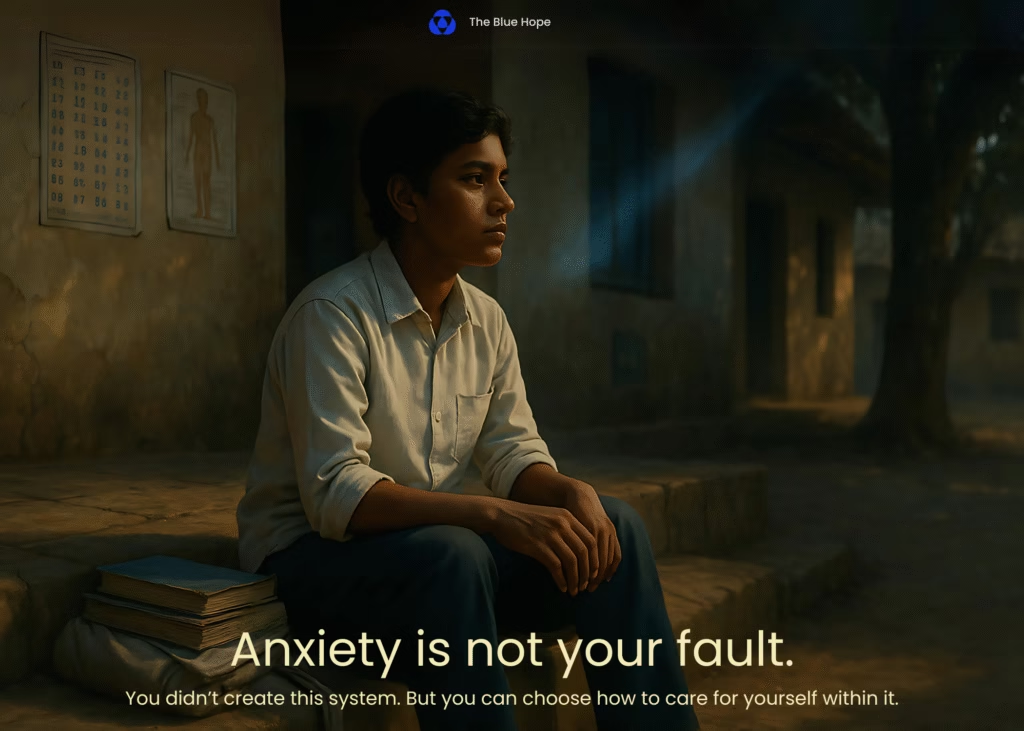
Managing anxiety as a Bahujan isn’t just about feeling better—though that matters deeply. It’s also about preserving your energy and capacity to create change, pursue your goals, and live with dignity in a system that wasn’t designed for your success.
The strategies in this guide won’t eliminate systemic injustice or completely remove anxiety. What they can do is help you respond to challenges with greater clarity, confidence, and self-compassion. They can help you distinguish between situations you can change and those you must navigate or accept. Most importantly, they can help you maintain connection to your worth and potential even when external messages suggest otherwise.
Remember that your anxiety makes sense given the realities you navigate. It’s not a personal failing but a response to genuine challenges. By developing tools to manage this anxiety, you’re not just improving your well-being—you’re reclaiming power in a system designed to diminish it.
Your mental health matters, not just for your individual happiness but as part of a broader movement toward justice and dignity for all Bahujans. By caring for yourself, you contribute to a future where anxiety stemming from caste discrimination becomes a historical memory rather than a daily reality.

